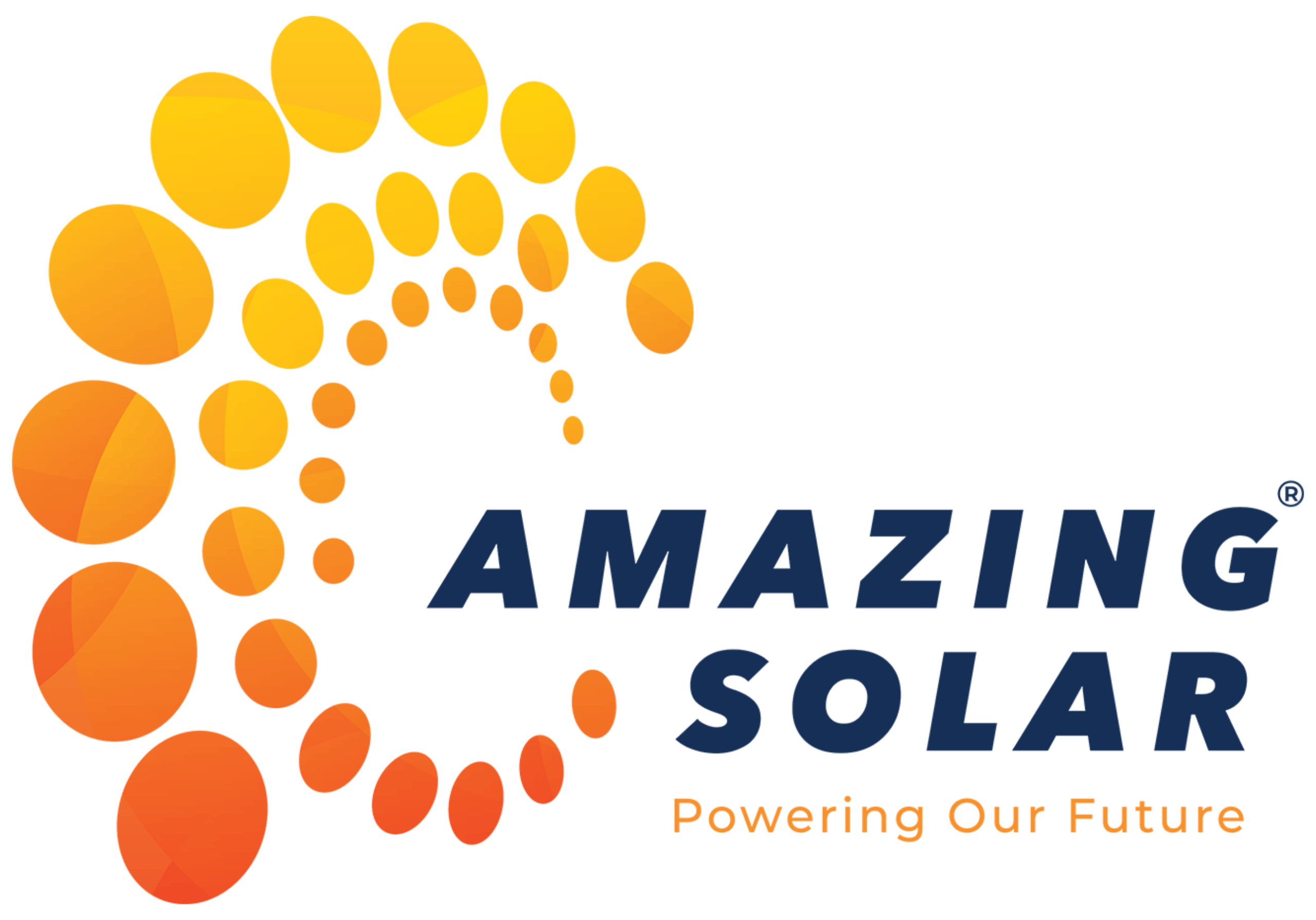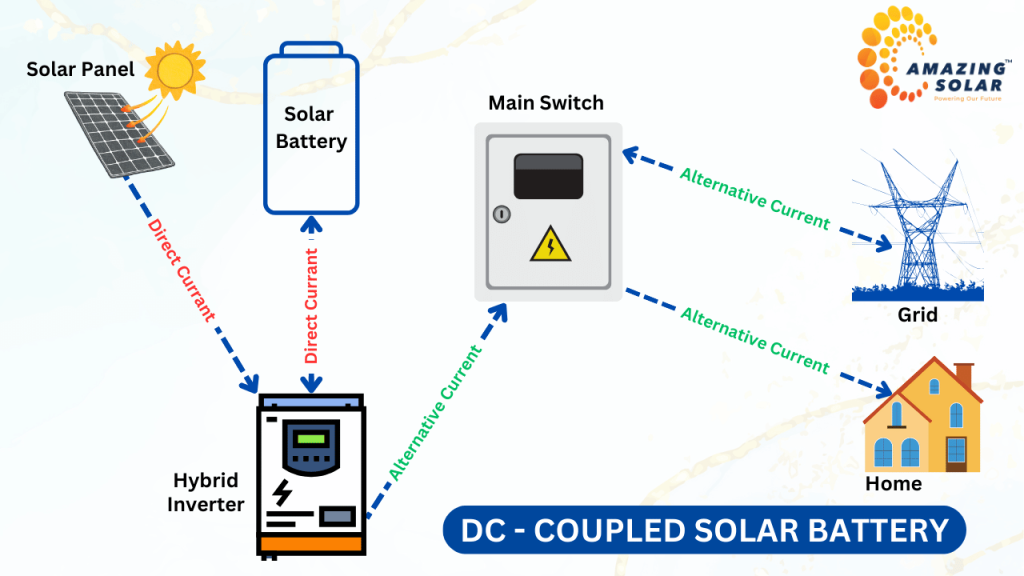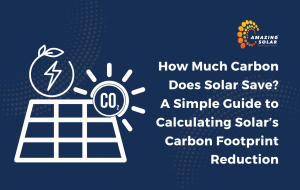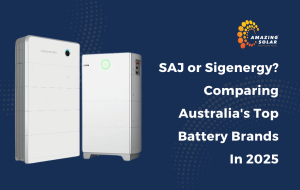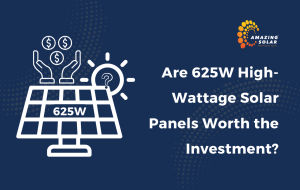When deciding on a solar battery, understanding the difference between AC-coupled and DC-coupled systems is crucial for making the right investment. These two types of solar batteries come with their own set of advantages and challenges, and the technology you choose will influence your system’s overall performance and cost. Let’s break it down to help you make an informed decision for your home.
What is an AC-Coupled Solar Battery?
In an AC-coupled solar system, solar panels generate DC power, which is then converted to AC power by an inverter installed at your house. Since your home runs on AC power, this conversion is necessary. However, batteries can only store DC power, so any surplus AC energy must first be converted back to DC for storage in the battery. If you decide to export electricity to the grid, another conversion from DC back to AC is required.
This method allows for more flexibility, especially if you want to retrofit a battery to an existing solar setup, as AC-coupled systems are compatible with almost any solar array. They also provide an independent operation for the panels and battery, meaning that if one component fails, the other can still function.
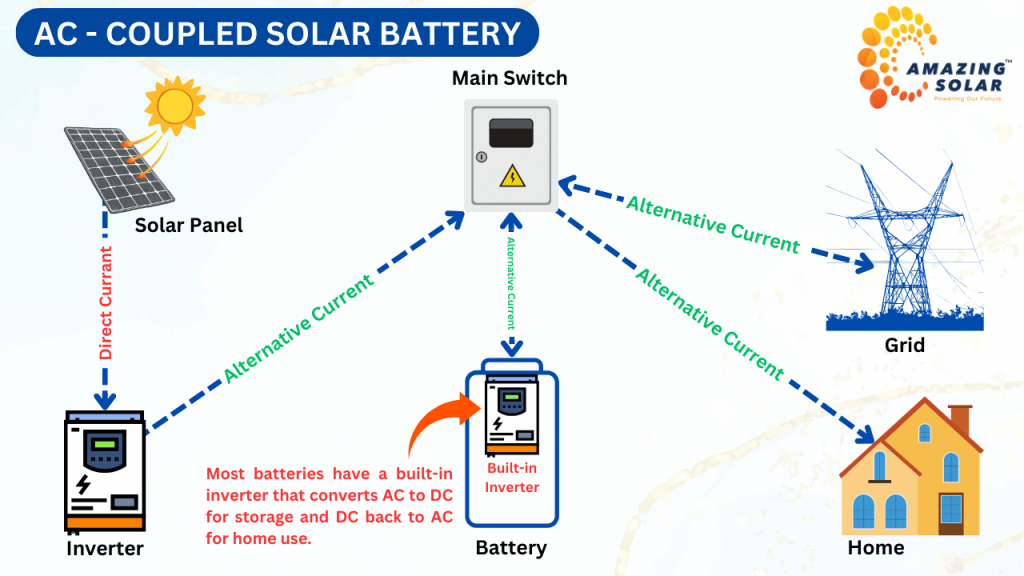
A DC-coupled solar battery operates differently. In this system, the solar panels’ DC power is sent directly to a central inverter, typically located on the side of your house, where it is either stored in the battery or directed to the grid. When you need the power for your home, the energy is then converted to AC.
DC-coupled batteries tend to be more efficient because there is less conversion from DC to AC and back again. This results in higher energy efficiency compared to AC-coupled batteries, as DC power is stored directly without any intermediate steps.
Pros and Cons of AC-Coupled Solar Batteries
Pros:
- Retrofitting Ease: AC-coupled batteries are great for adding to existing solar systems, offering compatibility with a wide range of solar technologies.
- No Single Point of Failure: In an AC-coupled setup, if one component fails (such as the battery), your solar panels will continue to supply power to your home.
- Grid and Time-of-Use Benefits: The battery can charge from the grid when needed, which is advantageous for connecting to Virtual Power Plants (VPPs) or taking advantage of time-of-use tariffs.
Cons:
- Higher Upfront Costs: AC-coupled systems are generally more expensive due to the need for additional components like microinverters.
- Lower Efficiency: AC to DC conversions result in energy losses, typically reducing system efficiency to around 90-94%, compared to DC-coupled systems which can reach up to 98%
Pros and Cons of DC-Coupled Solar Batteries
Pros:
- Higher Efficiency: With fewer conversions from DC to AC, DC-coupled systems offer higher efficiency than their AC-coupled counterparts.
- Lower Initial Cost: Since DC-coupled systems don’t require multiple inverters, they tend to be more affordable upfront.
Access to Power During Blackouts
Here’s a key point that sets DC-coupled batteries apart: they can be directly charged from your solar panels, even when the grid is out. That means if the power goes down in your neighbourhood, you can still rely on your panels to generate and store energy—keeping your lights on and essential appliances running while others are left in the dark.
Cons:
- Compatibility Issues for Retrofitting: DC-coupled batteries are less flexible and only work with certain hybrid inverters, making them harder to retrofit to an existing solar system.
- Central Point of Failure: The hybrid inverter is essential for the entire system’s operation. If it fails, your solar and battery systems will both be down.
AC-Coupled vs DC-Coupled Solar Batteries : Which is More Efficient?
In terms of efficiency, DC-coupled systems generally outperform AC-coupled systems. The reason for this is the reduced number of conversions between AC and DC, which minimizes energy loss. However, if you’re retrofitting an existing solar system, an AC-coupled system offers more flexibility and convenience. For a new installation, a DC-coupled system can be more cost-effective and energy-efficient, though it comes with the risk of a single point of failure
Conclusion: Which Solar Battery System Should You Choose?
When it comes to choosing between an AC-coupled or DC-coupled solar battery, it all depends on your needs:
- If you’re looking for a more flexible system that can easily integrate with an existing solar setup and prioritise safety, an AC-coupled battery might be the right choice.
- If you’re after greater efficiency and a lower initial cost, and Power During Blackouts DC-coupled batteries charge directly from solar panels, even when the grid is down. This keeps your lights on and essential appliances running while others are left in the dark., then a DC-coupled system could be the better option.
Ready to Take the Next Step? Call Amazing Solar Solutions!
At Amazing Solar Solutions, we’re here to help you choose the best solar battery system to suit your home and needs. Whether you’re looking for an AC-Coupled vs DC-Coupled Solar Batteries, our experts can guide you through the entire process.
For a free consultation or to get started on your solar journey today, give us a call on 1300 025 955. Let’s work together to make your home more energy-efficient and environmentally friendly!




